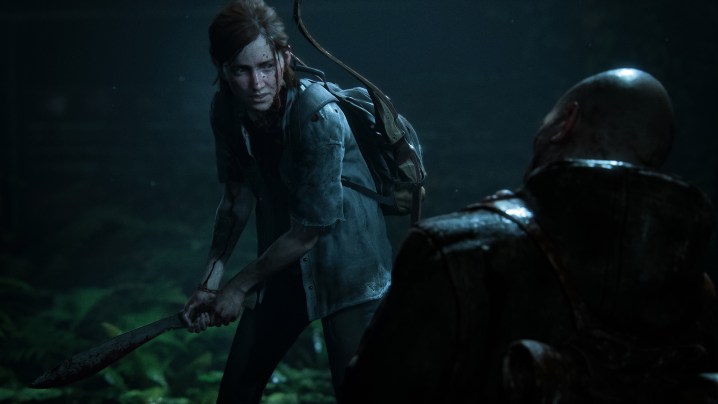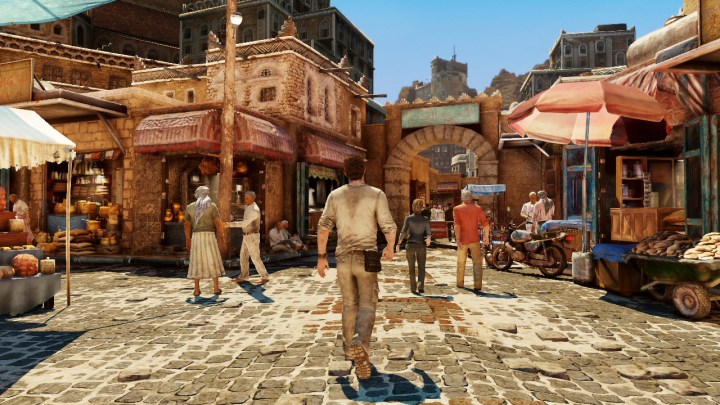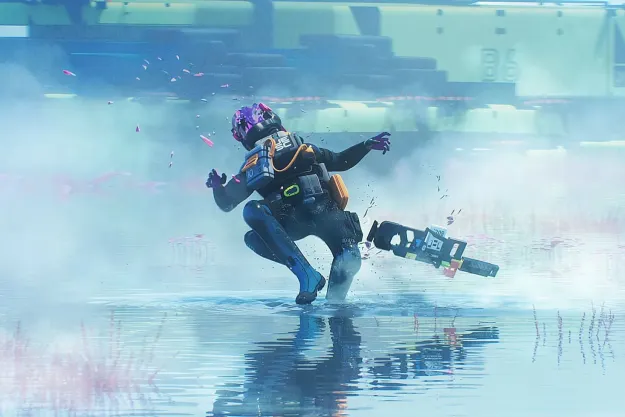
During PlayStation’s E3 2018 press conference, Sony chose to highlight four games; Death Stranding, The Last of Us: Part II, Ghost of Tsushima, and Spider-Man. On the surface, these games vary wildly in themes and content. Yet they share the third-person, story-heavy presentation that so many acclaimed PlayStation games have used in recent years.
It’s a choice Sony, and its partners, have used to stunning success time and time again, and this “walk and talk” makes the PlayStation 4 home to many of the most immersive games of all time. Developers supported by Sony have managed to seamlessly weave story threads into gameplay, and they’ve done it without having to deemphasize action or rely on unplayable cinematics.
A history of stories
PlayStation didn’t become the console of choice for story-heavy games overnight. The seeds were planted in the PlayStation 2 era, when titles like Jak and Daxter and Ratchet & Clank took center stage. Without the extra horsepower of the Xbox or even Nintendo’s GameCube, PlayStation 2 developers relied on expressive, yet relatable, characters. Master Chief kept his signature helmet on at all times, while Daxter’s over-the-top expressions gave him far more personality.
All those games have intense action sequences, but what happens when they’re quiet is just as important.
By the time PlayStation 3 rolled around, Sony had an even firmer grasp on its identity, as shooters like Killzone 2 and Resistance: Fall of Man feeling distinct from Microsoft’s Halo series. Then came Naughty Dog’s Uncharted series, which beat Lara Croft at her own game with a relatable protagonist, Nathan Drake, and a masterful blend of puzzle-solving and third-person shooting.
All those games have intense action sequences, but what happens when they’re quiet is just as important. When Nathan and Sully are scaling a cliff, or exploring an abandoned temple, they’re always discussing something. The topic of conversation is often relevant to their adventure, but it’s just as often not, giving insight into their relationship without peeling away control. Drake was funny, he was suave, he was downright cool – and we were more than willing to listen to his ramblings instead of blasting away at the next wave of baddies.
Naughty Dog wasn’t the first developer to characterize on the go like this – Grand Theft Auto often did it while characters were in vehicles – but the Uncharted series better controlled the pace of conversation to avoid hour-long episodes of silence. Naughty Dog showed restraint, whether it be because of budget limitations or a deliberate design decision, and made players focus on the main story.
This critical path structure gave the games ample time to plant the seeds of villainy in their supporting characters. Instead of waiting for a villain to pop out of nowhere, you’d hear someone bitterly complain about ruining their shoes, or think aloud of how they’d spend the cash they would find hidden in ancient ruins. Such foreshadowing made the inevitable showdowns feel like the end of a story, not a sudden obstacle introduced because the game needs a boss fight.
Enjoying a quiet moment
These themes were refined in The Last of Us, where Naughty Dog made full use of quiet moments to establish a believable relationship between Joel and Ellie. Perhaps the game’s most recognizable moment – the “giraffe scene” – is irrelevant to the overall plot, but the way it’s presented makes it seem you’re exploring a living, breathing world.
We see the beautiful animal, but also hear Ellie comment on its majesty and bizarre habitat, which likely would have been impossible (or missable) in a game with waypoints on an overworld map.
Naughty Dog knocked Uncharted 4: A Thief’s End out of the park, creating familial drama almost immediately without choking the player with too many cinematics. The studio had similar success with its standalone side-story The Lost Legacy, and it looks poised to do it again with The Last of Us: Part II, as the E3 gameplay demonstration detailed Ellie’s independence and deadliness through a mix of dialogue, quiet stealth sections, and all-out chaos. None of these elements are allowed to ever gain too much influence, as the key lies in their balance.
Sony understands that it’s okay for games to have endings.
Even God of War – a sequel in a series known for its over-the-top action and complete lack of subtlety – used the same principles to become a breathtaking action-adventure game. No longer is Kratos motivated purely by rage, nor does he exist as a tool players can use to vent their frustration.
Instead, his relationship with his son, Atreus, and his commitment to his deceased wife keep him going, and his continued conversations with Atreus between intense melee encounters help convey the unusual power dynamic of a literal god and his son. Sure, he’s murdering mythical monsters of all shapes and sizes, but he still takes the time to check in on his boy’s well-being.
Sony Santa Monica even managed to avoid the pacing issues traditionally present in more open-ended games, having Kratos or comic relief Mimir explain themes of Norse mythology, giving the unfamiliar world more context as they travel between objectives in a boat. These led to some of the most entertaining, insightful, and rewarding moments in the entire game, despite there not being a single creature to bash into a bloody pulp.
A one trick pony? Maybe, but it’s a pretty good trick
Sony has been knocked for only focusing on the “walk and talk” game at the expense of other genres. That’s not entirely true, as big-name titles like Horizon Zero Dawn take the modern open-world approach. Still, there’s good reason for Sony’s focus. It makes the PlayStation different.

Microsoft’s biggest titles, like Halo 5, Sea of Thieves, and Crackdown 3, rely heavily on online play. In the case of Sea of Thieves, a “make your own fun” model is used in place of traditional storytelling, and the game often feels empty and pointless as a result. Activision isn’t offering a campaign in Call of Duty: Black Ops IV, and Electronic Arts canceled a story-focused and linear Star Wars project in craft a replayable, online experience.
Sony, however, understands that it’s okay for games to have endings. We don’t want to play them indefinitely if we can instead have a thrilling, unforgettable conclusion. Imagine playing Uncharted 4 without its conclusive ending, and instead an open-ended exploration mode. It’d give you more to play, sure, but it’d also leaving the game without a clear ending. You wouldn’t stop playing because you’d finished it. You’d stop playing because you got bored.
While Microsoft, Activision, Ubisoft, and other major game publishers want you to tell stories, Sony and its partners are confident enough in their own tales to get them to you the old-fashioned way, and we’re thankful for it.
Editors' Recommendations
- I was a PlayStation Portal hater. Now it’s one of my go-to gaming devices
- The Last of Us Part 2 almost had a very different ending, according to Remastered commentary
- Our favorite PlayStation games of 2023: Spider-Man, Final Fantasy, and more
- Sony’s new PlayStation earbuds are a perfect match — for my Nintendo Switch
- PlayStation Portal misunderstands remote play and cloud gaming’s appeal






